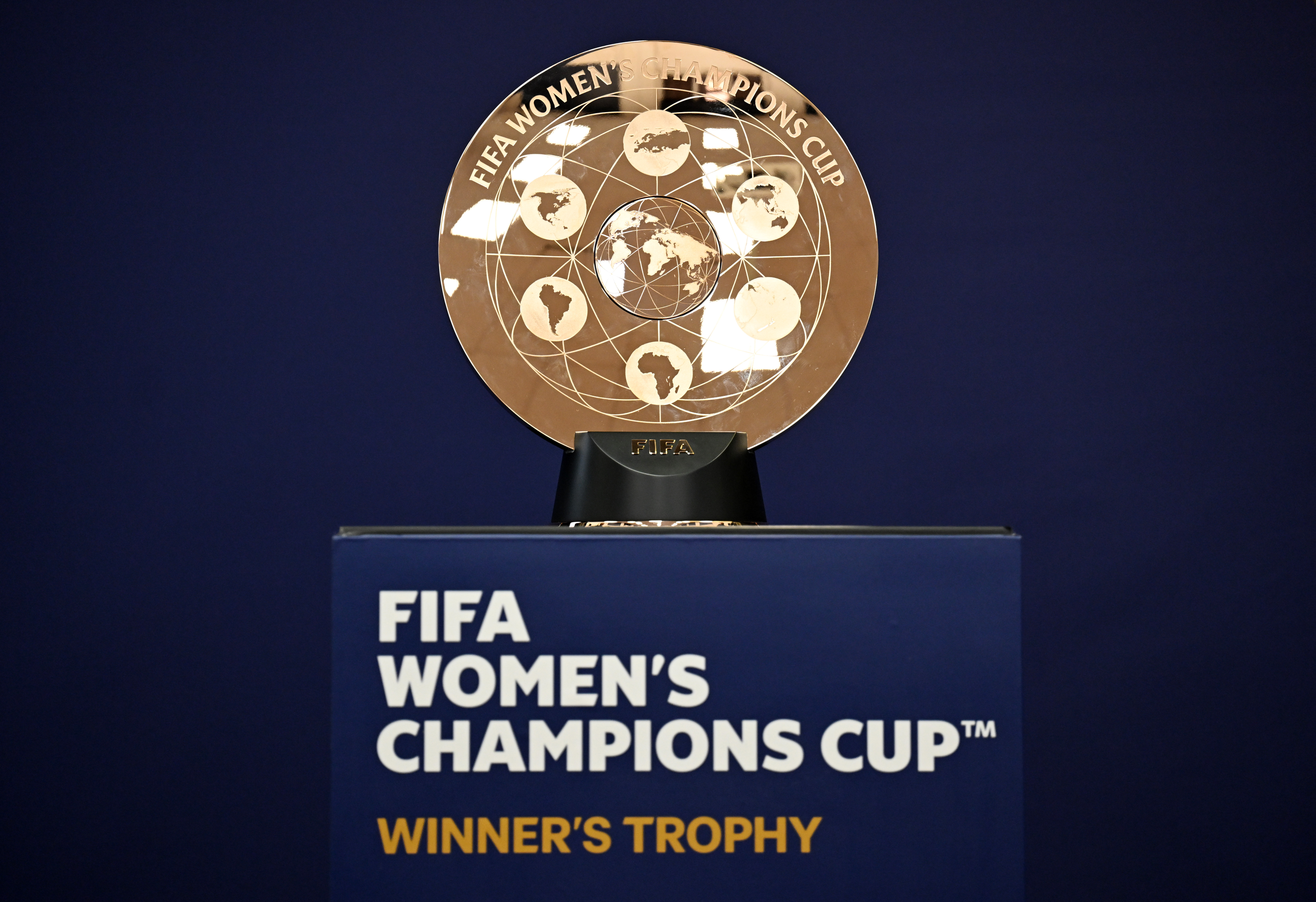On the hunt for Diego Maradona in Mexico: a thrilling journey to the other side of the world
FFT travels deep into drug cartel country to find a man loving life managing second-tier Dorados de Sinaloa – and more than happy to lend a hand at Old Trafford
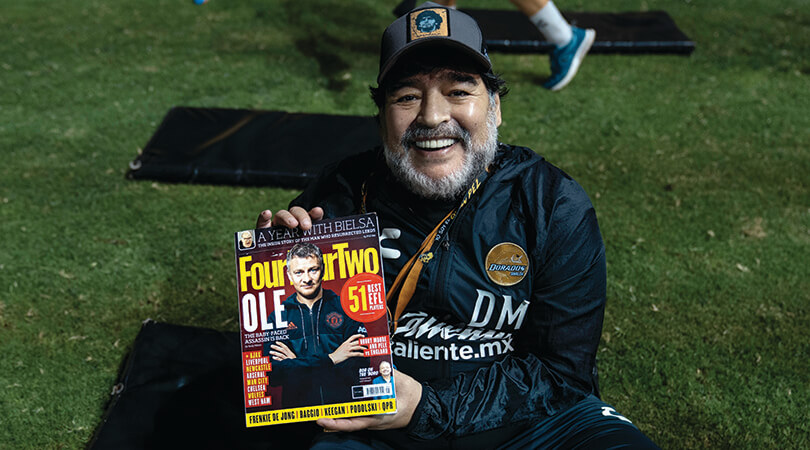
Please note: This feature originally appeared in the July 2019 issue of FourFourTwo. Maradona has since left Dorados and is now at Gimnasia in his homeland of Argentina. But we assure you, it’s not to be missed…
Photography: Toya Sarno Jordan
“Go to Mexico and track down Diego Maradona,” said the editor of FourFourTwo. Such a simple sentence and such an interesting idea, but so fraught with difficulties.
One: Mexican football’s second division was about to finish and there was little guarantee that he would stay into next season. We had visions of getting there, only to discover Diego pictured lying on a beach somewhere far away. The last regular game of the campaign was mid-April. The earliest we could get there was April 29, days before the Clausura play-off final.
Two: when we made contact with Dorados de Sinaloa, Maradona’s club, they were polite but very clear that the Argentine icon does not give one-on-one sit-down interviews. The 1986 World Cup winner speaks to the media only in pre- and post-game press conferences.
Three: Culiacan, Sinaloa, Mexico – Diego’s home since taking charge of Dorados back in September – was a byword for narcos and international drug cartels. The United States Intelligence Community regards the Sinaloa Cartel, of which Joaquin ‘El Chapo’ Guzman was the leader, as the most powerful drug trafficking organisation on the planet.
This is a place where few tourists dare go, and when FFT purchased The Rough Guide to Mexico, there wasn’t one single word about Culiacan, a city of 785,000, in its 1,979 pages. Almost every mention of Sinaloa, the state of which Culiacan is the capital, relates to crime. In April, the US imposed its highest level four ‘Do not travel’ warning on Sinaloa due to the danger to visitors. Syria also has a level four. Further US government advice was even less encouraging: ‘Do not travel to Sinaloa state. Violent crime is widespread. Criminal organisations are based and operating there.’
The best features, fun and footballing quizzes, straight to your inbox every week.
Four: it ain’t cheap to send a journalist from Europe to Mexico, especially when there’s no concrete plan in place. But with 10 minutes left of Manchester United’s dire 1-1 draw against Chelsea, this writer legged it out of the Old Trafford press box only 70 minutes before a flight to Paris.
My brother waited outside the stadium with the engine running, security let me through and I just made the flight, and the one-hour connection in France. The 12-hour overnight flight to Mexico City (which flew straight back over Manchester) landed in darkness at 4am local time. After a three-hour wait, I hopped aboard a two-hour flight on a small plane of casually-suited men north to Culiacan, which sits close to the Pacific Ocean and is eight time zones from the UK. As we travelled east, I saw daylight for the first time in 20 hours, revealing some sun-scorched craggy mountains.
The photographer, an Argentine living in Mexico City, would touch down six hours later. I needed more information and tried to strike up a conversation with the adjacent passenger in the 10 minutes he stopped sleeping as the plane landed. Tried.
We arrived at the airport, which one guide said, “in the 1960s accelerated the expansion of a workable distribution infrastructure for the enterprising few families that would later come to dominate international drug cartels along Mexico’s Pacific Northwest”. It was 32 degrees and very humid.
Questionable taxi hawkers waited outside arrivals but the queue for the official taxis was orderly and efficient. The driver was animated and open, too.
“Maradona is popular here,” he says. “And you’ll be OK with the precautions you’d take in any city. Everyone associates this place with narcos and everyone is aware of them here – they’re part of us and our traditions. People even take pride in them and there are coridos (a form of song) about the drug lords.”
The traffic is aggressive and locals attribute this to the ‘Sinaloense’ attitude: stereotypically aggressive, proud and boisterous. My hotel awaits, 22 hours after departing Old Trafford.
Certain things had fallen right for us beyond the flights. Dorados ended the season strongly to reach the play-offs, beating Cimarrones de Sonora 3-0 on aggregate in the quarter-finals, then Mineros de Zacatecas 5-1 on aggregate in the semis. They’d played the semi-final second leg the night before we arrived. Had they gone out, I would have been too late.
Because Maradona’s team were now in the final, a couple of players would be speaking to the media before a training session that night – a training session that Diego would be taking.
At the hotel, jet lag means sleep is nigh on impossible. The receptionist shakes her head when asked if there’s a map of the city around. Her colleagues reveal there’s nothing to really see downtown, but there’s a large modern mall with a department store called ‘Liverpool’. I wait in a cheap restaurant for the snapper to turn up and read Maradona’s 2004 autobiography, El Diego.
“He couldn’t see a cow in a bathroom” is one of several great lines. An editor has added an asterix to some details omitted in the original Spanish version of the book, for example: “*In 1994, Maradona was arrested for possession of cocaine” or, “*The incident referred to here is the much-publicised affair when Maradona responded to persistent door-stepping by firing an air rifle at congregated journalists.”
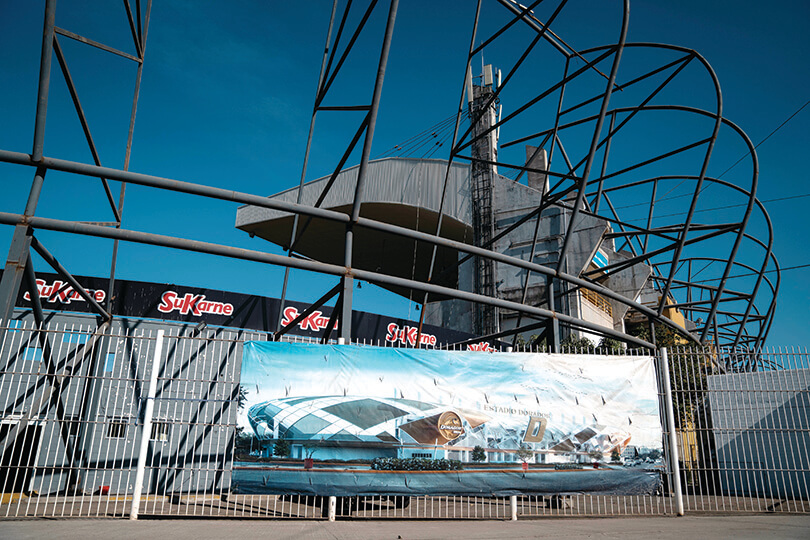
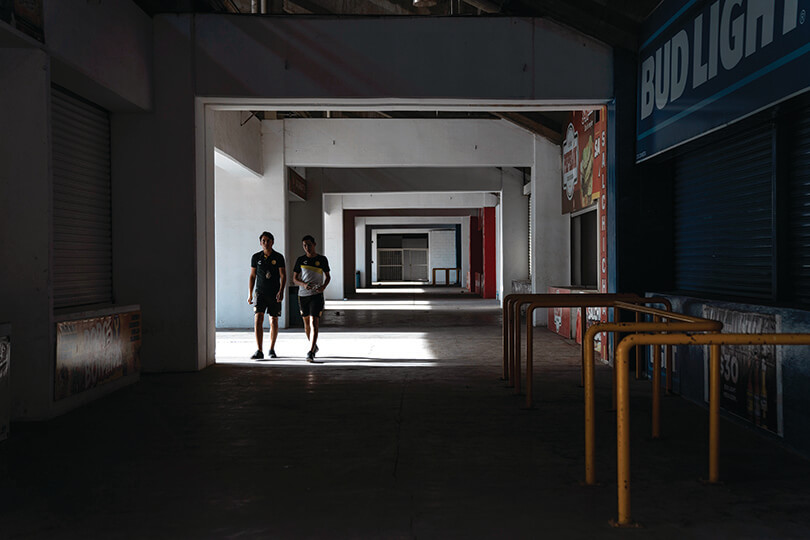
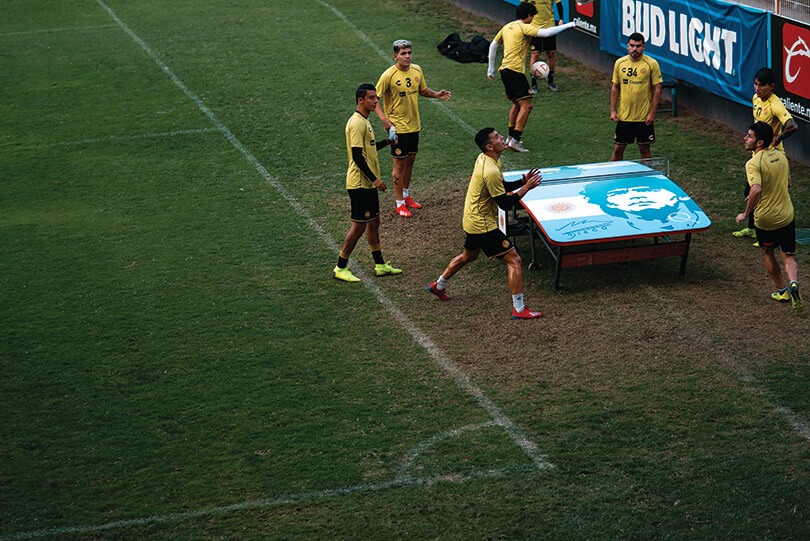
The photographer and I head into town in a dirt-cheap Uber. Culiacan looks remarkably pleasant. Beyond numerous car showrooms, there’s a river running through a park, and a pretty white cathedral. Elderly men sit in the shade. There’s no evidence at all of a football team nearby and the sports shops sell shirts of Mexican giants Puma, Chivas Guadalajara, the Mexican national side and Real Madrid. Perhaps it’s no surprise – Dorados was only founded in 2003.
We walk the streets, where shops attract customers by blaring out Mexican pop music. One man sits by a desk, on which is a pitifully small number of newspapers. And there, on the front page of El Sol de Sinaloa, is a picture of fans queuing under the headline: “Everyone wants a ticket – hundreds of people queue for tickets for the grand final between Dorados of Sinaloa and Atletico San Luis.”
On page 30 in the sports section, a report from Dorados’ 2-0 win at Mineros two days earlier is titled, “The Magic of Maradona remains intact.” We then take another taxi to the ground – “which one, the baseball?” asks the driver, since baseball is the bigger sport in the city – and arrive 80 minutes before the training session, to speak to fans snapping up tickets in the late afternoon sun. They all say similar: that a) they like Maradona and sing songs about him b) he’s done far better than they expected c) his arrival was a huge lift for a city with a negative perception and d) his players love him and the team spirit is superb.
We need to get out of the sun, and a group of men are hanging out in front of a bar with white bars across the serving hatch. “American?” one of them asks. They are intrigued that we are British and Argentine, so I enquire: “How much do you know about Great Britain?” “John Lennon,” replies Raul, a 47-year-old whose sun-baked skin makes him look about a decade older. The Beatles are huge in Mexico.
“And in this part of Mexico, baseball is the main sport,” adds Raul as his friends eye up the photographer. “It’s 30 per cent soccer and 70 per cent baseball, so we produce baseball players here. Maradona goes to the baseball. He doesn’t take security but travels alone and always stops for photos.
“He lives in a house – not a hotel. They pay him $150,000 per month, so not bad, eh? He has liberated this team, motivated them, and we’re so proud that the greatest footballer this planet has ever produced is doing this to our little team. When Diego arrives at the stadium, the fans are waiting for him and sing his name. He’s in a good place here.”
The conversation turns to the narcos gangs. Of the 50 most famous people from Sinaloa listed on Wikipedia, 11 of them are big-time drug lords with their own in-depth entries in several languages.
“It was bad between 2005-07 and again a few years ago, but it’s not as bad now,” says one Dorados fan. “This place is perfect because it’s close to the US and conditions are perfect for growing marijuana – the plants can grow to 1.5 metres.” In 2015, the army discovered the largest ever Mexican marijuana plantation thriving in the fertile Sinaloan soil. Poppies, for synthetic heroin, have been growing here for more than a century.
We cross over the road and enter gate six of the Estadio Banorte, a smart but not quite finished 20,000-seater venue with yellow and blue steep-sided stands backing onto a river. Twenty-something footballers park their cars inside and outside the gates and politely say hello. We tell an official that we’re visiting from England and he offers to take us to the main stand, but we have no promise of even seeing Maradona and the snapper would rather wait by the gate where the great man is expected to arrive in an hour.
Local journalists gather in the stand and fill us in with information about the players and Maradona, as we await the squad coming out to train once the sun has dipped behind the mountains that frame the flat plane on which Culiacan stands.
“Some say it’s violent here because of the narco traffic, but the people are friendly and Maradona has discovered that,” says Cristian Barcelo from LocalTVP.
He explains that Maradona arrived with four coaches and four new players, all Argentines. Mexican football is powerful and can plunder the top Argentine talent which Europe misses. Playing for Maradona is a dream for many of his compatriots, and they find that the reality of living in Culiacan is so much different from the global perception.
“The seafood here is the best and the girls are the most beautiful in Mexico,” points out Aurora Low, a local TV presenter. Some of the beautiful Sinaloa women drawn to gangsters are buchonas, with their long eyelashes and longer nails, enhanced breasts and even more enhanced posteriors.
A group are making a Diego documentary and have spent months shadowing their subject.
“There were a lot of doubts about him when he arrived – a lot,” says one of the crew. “He’s proved a lot of people wrong.” Given the last public images many saw of Maradona were of him intoxicated, being helped away from the Saint Petersburg stadium to hospital following Argentina’s World Cup game against Nigeria last June, those doubts were understandable.
As his players get ready for training, 50 fans filter into the ground and unwrap drums and flags behind the goal. Like on terraces around the world, they bellow Argentine-influenced songs with the words changed for their coach. “Come with me, sing with me, you’ve got a friend in me,” they sing. “Holding Maradona’s hand we’ll be promoted.”
El Diego appears from the tunnel flanked by his coaches. He walks with a heavy limp to the centre circle to applause from the crowd. He sports a trimmed grey beard under a cap with his face on, and still wears those Puma Kings he conquered the world in.
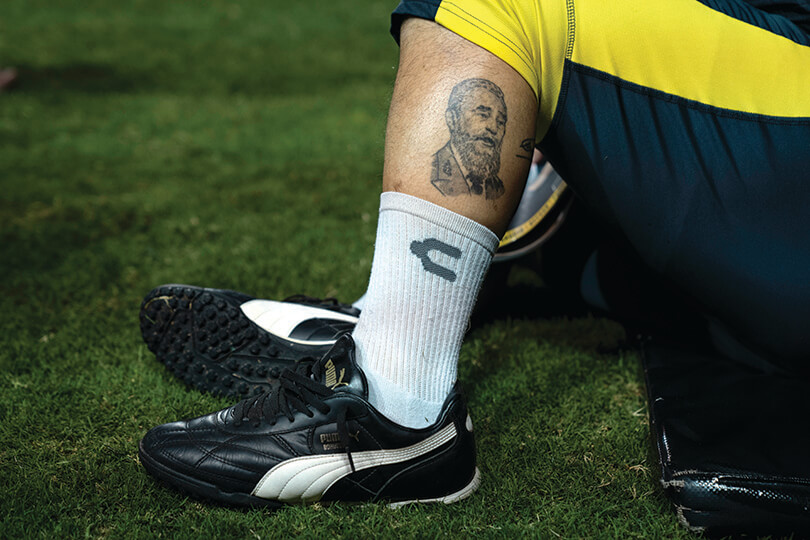
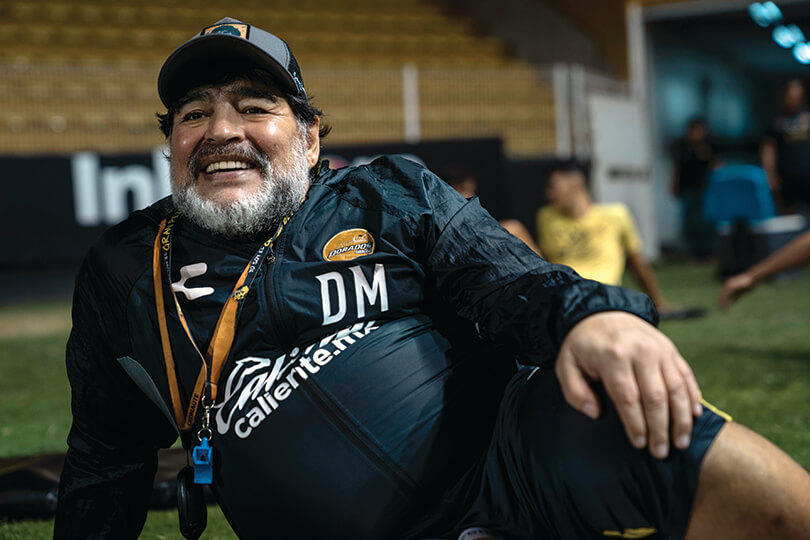
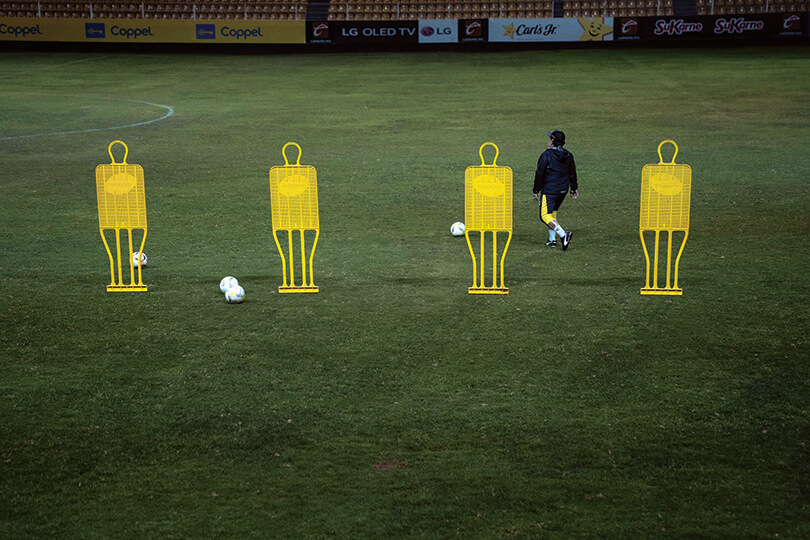
Maradona’s throne is an icebox situated in the middle of the pitch. He rests himself on it and then watches the fans perform. His players limber up for a full hour before actual training starts, and play Teqball on a table emblazoned with Maradona’s head against a backdrop of the Argentina flag.
The fans, brandishing a Che Guevara-style image of Maradona’s face, sing as Diego waves his arms, claps his hands and plays imaginary drums in appreciation. He’s the star of a show which isn’t supposed to be a show. He decides the structure of the evening and when training will start. Dorados’ own club media get close and film him, and they get some words, too.
Watching Maradona from the stands, we want a piece of that action. Someone approaches wearing a Dorados training kit.
“I might not look like it, but I’m the club president,” reveals Jose Antonio Nunez. The 44-year-old has heard we’ve travelled a long way, and makes his way up from the pitch for a chat.
“We had some good players here before Maradona but a bad inertia,” he begins. “Results were not going well and we decided to change coach. The owner of the club proposed some names, but I didn’t like any of those names.
“We argued about what to do next, then I received a call from Argentina, from a representative who’d met Maradona in a Buenos Aires restaurant. He wasn’t his agent, but Diego had asked him to find him a job.
“As soon as I heard the word ‘Maradona’, I didn’t speak for 30 seconds, then I thought, ‘Maybe I’m the only guy who’s going to go for this.’ So I called the owner, Jose Alberto Hank [the nephew of Jorge Hank Rhon, the former mayor of Tijuana on the US border whose Caliente group owns an empire of casinos and hotels].
“The owner agreed as long as we could get the salary to fit,” adds Nunez. “He said, ‘Go for it.’ I thought Diego could change the negative inertia and inspire the players because of who he was, but I was also worried as I didn’t know him personally and had read many bad things about this great player from football history.”
Nunez phoned Maradona.
“I told him that we were a second-division team without a big budget,” he reveals, “and that we were from a small Mexican city which had been hit badly by violence in the past but was safer now. He listened to me explain that I wanted him to be the coach and he said he really liked the idea. And from there, Maradona became our coach.”
The president pauses and yells to a kitman, requesting some baby oil.
“It’s for these,” he says, wafting away small flies which have bitten a neat ring around my ankles, drawing blood a dozen times on each leg. “The river is behind the stand and they all come from over there. We’re going to have the stadium disinfected before Thursday’s game.”
A bottle of baby oil promptly arrives. “Here, rub some in,” says Nunez. The DEET I’d sprayed on both legs has not done the job, so we both sit rubbing in baby oil. It’s time out from an impromptu interview that has barely started.
“My son is crazy about Newcastle United,” he says. “Absolutely crazy and I have no idea why. He’s not happy with the owner, though.”
Are the fans happy with the president here? “They asked to come along tonight and I was happy for them,” he says. “They’re happy with the coach and they should be. I was afraid of what my relationship with him would be like at the start. This is a guy who wears two Hublot watches and is known around the world, but there’s a humble side to him.
“He started working straight away, got to know all the players and is very close to them now. He kisses every player after every training session and asks how they’re doing. He cares about them. He saw the players who wanted to succeed and brought some players in from Argentina. They are like Vikings – they’ve got a different, winning mentality.
“Diego enjoys life here. He goes alone to the shops and restaurants, which he can’t do back home in Argentina. Pep Guardiola told me the same when he lived here. We’ve not had one problem with Maradona. On the contrary, he even asked us if he could help the street kids. He wanted to meet them and asked how our sponsors could help them. He went to a house where the street kids can sleep and kissed the children one by one.
“As for the trainer himself, he looks better week by week. Look at him now, does he look unhappy? He arrived and said, ‘Now I’m here, I will help you’ and he has kept his word. He’s done so well that there have been other offers for him, but he’s insisted: ‘I’m not finished here yet. There’s a job to be done.’”
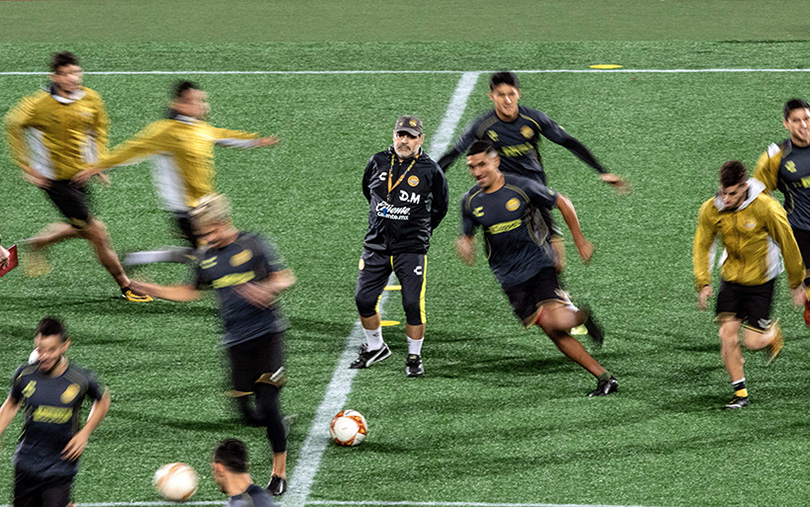
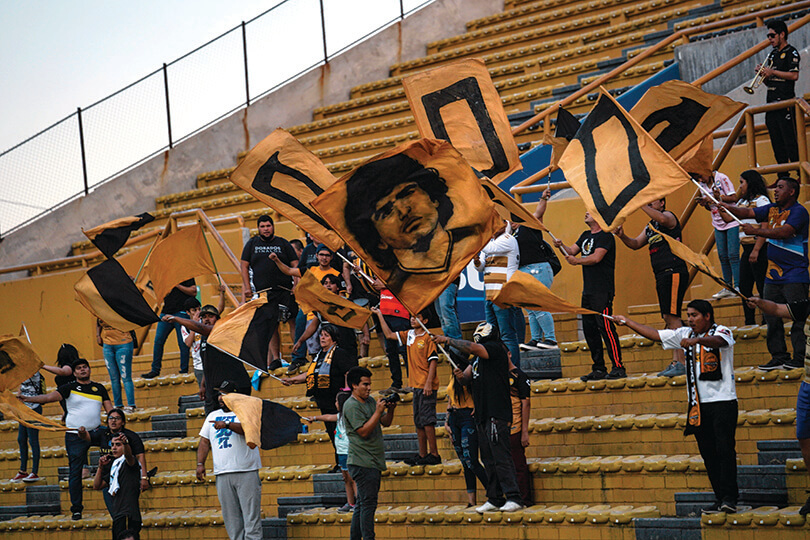
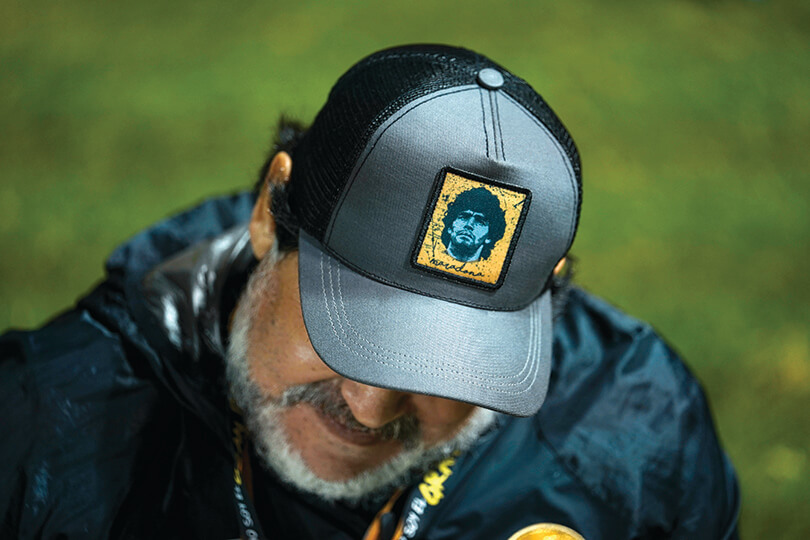
The president has got to know Diego well.
“Mexico is huge and every match requires a flight, so we spend a lot of time together,” he adds. “The closest game by coach would be nine hours away.
“People say Maradona’s crazy, but while he’s far from relaxed at the end of matches, we’ve only seen him get mad once. That was at half-time against Hermosillo – it was 0-0 and he shouted, ‘That’s not my team.’ He was furious, but we won 2-0.”
Maradona did threaten to quit a month ago, suggesting referees didn’t treat his side fairly because he was in charge. Diego was also fined after dedicating one victory to Venezuelan president Nicolas Maduro, and he has also criticised Donald Trump.
Dorados play in the 15-team Ascenso MX, Mexico’s second tier. The annual wage bill is $4 million; Club America, the biggest team in Mexico, spend $80m. Only one outfit can go up, by winning either the Apertura or Clausura play-offs in the season’s two stages, then a two-legged promotion final unless the same team has won both play-offs.
“The top league is the most protected in the world with only one team relegated – it’s such a closed shop,” laments Nunez. “We work hard here to make this club work. Our average gate is 7,000 but we’ll be full for the play-off final. Around 20 per cent of our money comes from ticket sales, 40 per cent from TV revenues and the rest from sponsors.
“The TV money is 10 times as much in the top league but it’s exhausting to get promoted. Let me explain. We’re in the Clausura play-offs featuring eight teams. We’re now in the final and play two games against Atletico San Luis. If we win, we’ll have to play two more games against San Luis and beat them again, as they defeated us in the Apertura final.”
The play-offs bring stress, but also plenty of excitement and tension. “I was worried before one match, but then I saw Diego drinking mate through a straw, then puffing on a big Cuban cigar. He looked relaxed. If he was relaxed then why wasn’t I? We won that game, too.”
All this talk is interesting but we still need Maradona – a photo at the very least. I tell the president that we know Maradona doesn’t do one-on-one interviews, “but any help you can get us for a picture and some words would be much appreciated”.
“I can ask him for you,” replies Nunez after what has turned into a one-hour natter while Dorados train on the pitch. “Come on, let’s go and see his family.” Introductions are made.
“Where are you from?” asks Maradona’s girlfriend, Veronica Ojeda, who’s watching on with six-year-old Diego junior. Maradona has another son called Diego to Italian Cristiana Sinagra, and there are more children in Cuba. “Manchester – I’ve travelled here to write about Dorados and a man you all know very well, and hopefully talk to him.”
“Welcome – he should talk to you,” she tells me with a smile. We’re led onto the pitch by the president. Maradona lies stretching on a mat – and then, as I hold my breath, he looks over and shouts, “Hola”. The president has a word in his ear and beckons me over.
“You’ve come here from Manchester?” asks Diego, slightly impressed. His players look on and listen under the floodlights. One of them, Argentine goalkeeper Gaspar Servio – on loan from Banfield – had a tattoo of his boss inked on his leg the previous month.
“Yes, I was at Old Trafford yesterday and left the game early to catch the first of three flights to come here to write about Dorados and you.”
“Did they win?”
“Drew 1-1 with Chelsea. Bad game.”
“Manchester United used to be my favourite English team for so long,” says Maradona. “So many great players and a great team under Alex Ferguson. But now I have to say Man City. I know you shouldn’t change like that but it’s because of Kun [Aguero]. We speak a lot and he plays in a very good team. You see the thing with Pep…”
Maradona starts sketching shapes out on the grass with his hands in thrall to the tactical acumen of Guardiola. “His team are athletic but they still use the ball smartly,” he explains. “Football should be all about the ball. I sometimes get frustrated when watching English football. I like it but it can be too athletic – too much power and too little beauty.”
“Enough about City,” we chuckle.
“OK. With United I liked Ander Herrera. Paul Pogba? Doesn’t work hard enough. I played at Old Trafford [in the 1983/84 Cup Winners’ Cup quarter-final]. What noise, like La Bombonera. I use that game as an example to my players.
“Barcelona won the home game 2-0 and we went to Manchester confident. Too confident, as we lost 3-0 and went out. I told my players about that when we were 3-1 up after beating Mineros last week. I told them not to let what happened to me happen to them, and we won 2-0 in the second game on Saturday.
“And I remember that game in Manchester. Bryan Robson – he was my favourite English player of that generation – played that night. But I should have won a penalty in that game! Bryan Robson and Graeme Souness were the best British midfielders. Great players.”
Wasn’t he once on the verge of moving to England to play for Sheffield United? “Sheffield,” nods Diego. “And Arsenal. Both. But [Cesar] ‘El Flaco’ Menotti wouldn’t let me. He said I was too young. He was my coach for Argentina’s youth team and we won the World Youth Championship in 1979. He said I should stay with Argentinos Juniors, so I did.”
Why did he decide to manage a team in the Mexican second division?
“Why not?,” he responds. “I’ve always liked Mexican football, they try to play and use the ball, to treat it well and not foul. The food is good, the weather is good and my family are happy here. It’s tranquilo. I wanted to coach again and I wanted to coach in Latin America. I’ve been in other places, too.” Maradona has coached in Argentina and UAE.
“I’m glad that I’ve come to work with these boys,” he says. “I tell them there’s no pressure except when we play a game, so they should enjoy every training session with a smile. The spirits are good. We were 13th from 15 when I arrived and have reached two play-off finals – we haven’t lost for 10 matches.”
Diego’s voice is croaky but his smile reveals perfect teeth and he looks better than he has for years, though health issues are never far away. He spent several days in hospital earlier this year with internal bleeding in his stomach.
“I can teach these players,” he insists. “I’ve arrived in the penalty box 3,000 times in my life, so I know about timing.”
He looks down and starts to flick through a proffered copy of FFT. “Four. Four. Two,” he says in English. His team plays 4-4-2. “I will tell my friends Osvaldo Ardiles and Ricky Villa that I have been speaking with FourFourTwo.”
“And you’ve been in Mexico before, at the 1986 World Cup,” I prod.
“Englishman, you remember it!” he laughs, remembering the Hand of God. “My life’s best.”
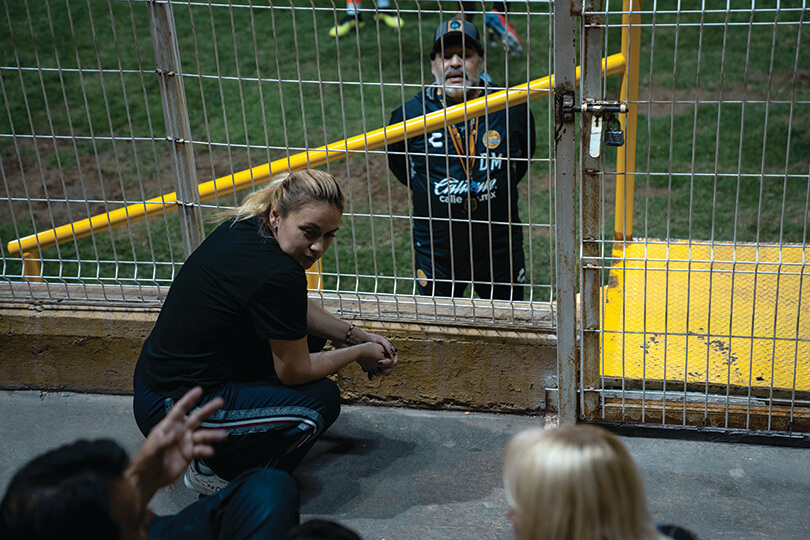
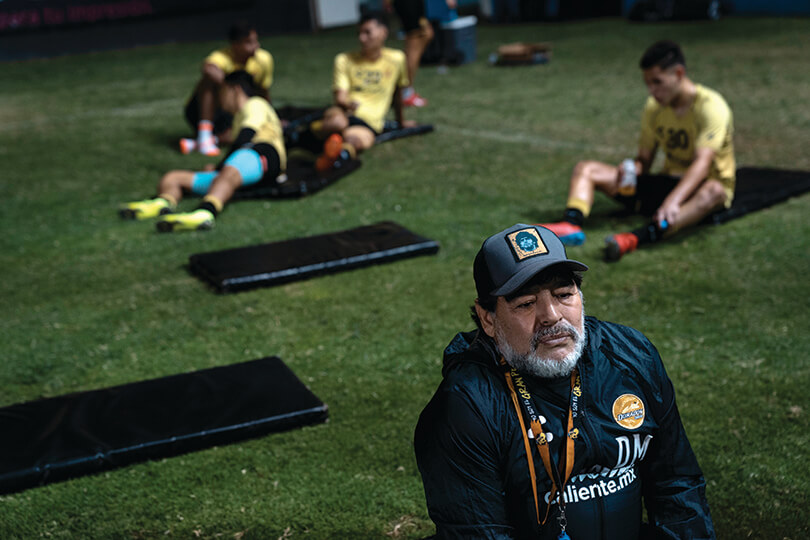
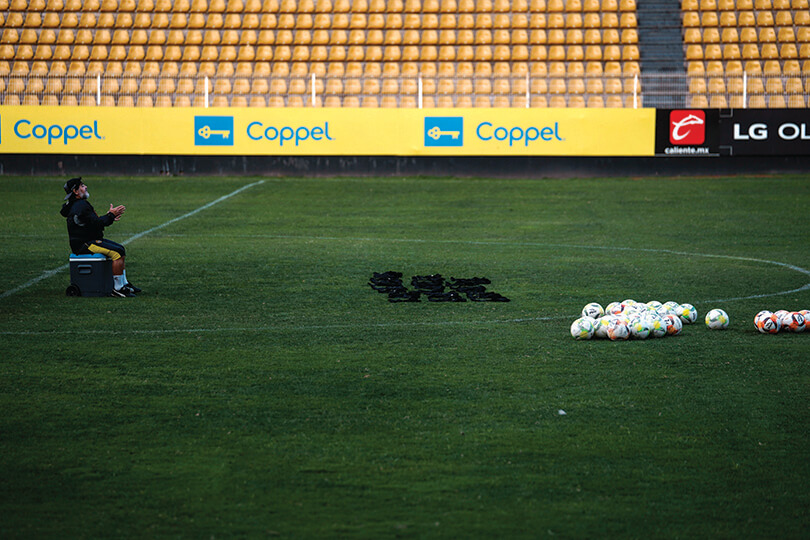
All of his players join in the laughter – they clearly adore the Argentine.
“He’s a humble guy, a man who gives a lot of advice which we soak in,” says Rubio Rubin, a Mexican forward born in Oregon with seven caps for the US national team. “Of course he has a huge presence because of who he is, but his advice is pretty simple – play the game, let the ball move, let the game flow, and let your mind do the work.
“When I practise free-kicks, he advises me on technique and what part of the foot worked for him. It’s still up to you to put his words into actions. And he works – he’s now taken us to two finals and we have an opportunity to win and get promoted.”
What type of coach is Maradona? “I’ve played professionally in Holland and Norway and he’s the best coach I’ve worked with,” beams Rubin, on loan at Dorados from Tijuana. “He has assistants helping with video analysis, but he’s the leader, the unmistakable coach, the motivator.
“He’s a funny guy too; he sits with us before training and tells us stories from the life he’s led, from injuries to the games he’s played in. He sings with us in the dressing room, too. He likes it here and so do we. People say it’s very dangerous but nothing has happened to me or any of the players. We go to the beach, but Diego doesn’t come – he has his family here.”
The players head off after three hours on the field. Maradona walks back to talk to me.
“If Manchester [United] need a coach, I’m the man to do it,” he smiles. “I know they sell lots of shirts around the world, but they need to win trophies, too. I can do that for them.”
With that, Diego hobbles away grinning. The adrenaline of coming so far to meet someone we were told we wouldn’t have a chance of meeting, speaking to him and being allowed to take his picture overrides my crushing jetlag and legs full of itching bites.
Maradona may be small in stature, but he’s a huge personality and the aura around him has made Dorados of Sinaloa fall hopelessly in love with him. With me he was genial, funny, relaxed, the gracious indulgence of someone who knows he’s still a king and will always be one. Like the ever-present flies, I’m buzzing.
Two days later Diego’s side draw 1-1 in the first leg of the final against Atletico San Luis, a club part-owned by Atletico Madrid who beat Dorados in December’s play-off final after the Apertura stage of the season.
In this Clausura settler, Maradona’s men lose the second leg 1-0, denying the Argentine his maiden trophy as a manager. Football still has the power to hurt him. “I nearly died, but it’s fine,” he stated. “I’m sad for my boys, though.”
Dorados will not get out of the glue pot that is the Mexican second division this year. But now he needs to message Ricky Villa and Ossie Ardiles to say he’s going to be in FourFourTwo.
This feature originally appeared in the July 2019 issue of FourFourTwo.
While you're here, why not take advantage of our brilliant subscribers' offer? Get 5 issues of the world's greatest football magazine for £5 – the game's greatest stories and finest journalism direct to your door for less than a pint in London. Cheers!
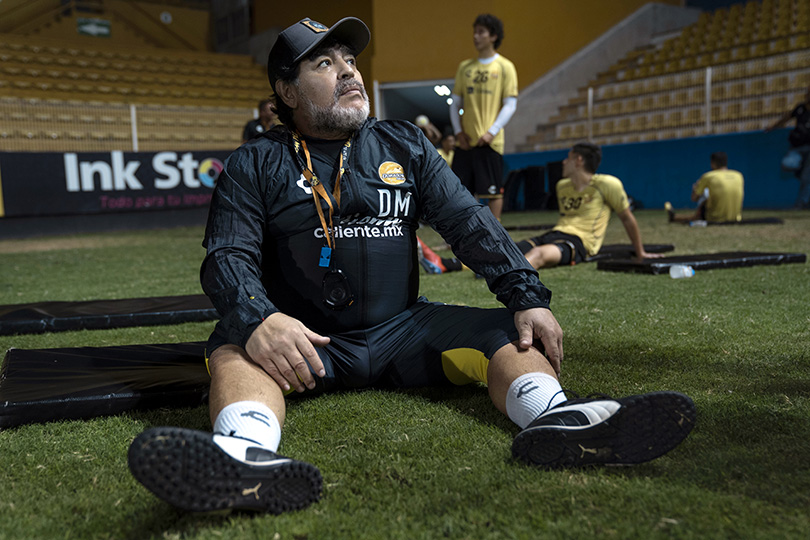
NOW READ
UNPOPULAR OPINION Why Zlatan Ibrahimovic is the most overrated player of the modern era
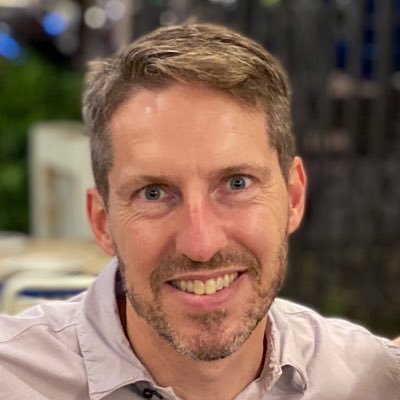
Andy Mitten has interviewed the likes of Lionel Messi, Eric Cantona, Sir Alex Ferguson and Diego Maradona for FourFourTwo magazine. He also founded and is editor of United We Stand, the Manchester United fanzine, and contributes to a number of publications, including GQ, the BBC and The Athletic.
 Join The Club
Join The Club





